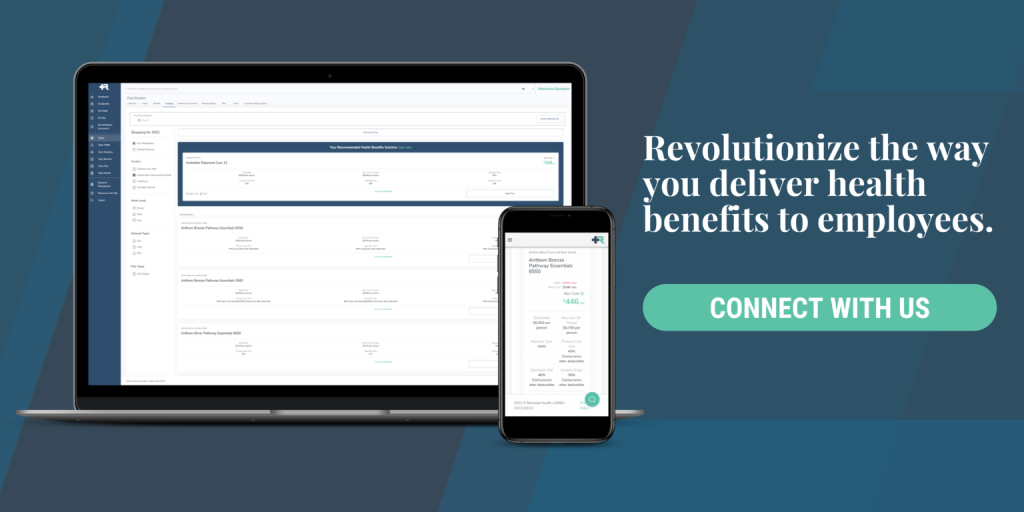How to Offer ICHRA Alongside Other Employee Benefit Programs
By Mallory Meyer on Nov 19, 2024 8:52:00 AM

As businesses continue to explore flexible health benefit solutions, offering ICHRA alongside other employee benefits is becoming an attractive option. ICHRA allows employers to reimburse employees for health insurance premiums and other qualified expenses, providing a personalized approach to healthcare coverage.
But how can you effectively integrate ICHRA and other employee benefits?
When used alongside group health plans, health savings accounts (HSAs), or flexible spending accounts (FSAs), ICHRA offers a dynamic way to meet diverse healthcare needs. Additionally, employees with lower household incomes may benefit from premium tax credits, further enhancing their overall health coverage.
In this blog post, we’ll explore how you can provide the right benefits for your team, making healthcare more accessible and manageable for everyone involved.
ICHRA Fundamentals
An Individual Coverage Health Reimbursement Arrangement (ICHRA) offers a flexible way for employers to reimburse employees for individual health insurance premiums and other qualified medical expenses. With ICHRA, employers can set tax-free reimbursement limits based on employee needs. This structure allows employees to choose their own individual health insurance plans, rather than relying on a group health insurance plan, providing more freedom in healthcare decisions.
Employees who qualify for ICHRA must meet specific criteria, such as being full-time or part-time employees of the company. ICHRA can be offered by businesses of all sizes, whether small businesses or large corporations. Employers must comply with regulatory requirements, including ensuring that plans meet minimum essential coverage standards under the Affordable Care Act (ACA).
By reimbursing employees for qualified health insurance expenses, ICHRA provides a tailored solution that benefits both employers and employees, helping manage healthcare costs while supporting employee health and wellness.
Read More | A Comprehensive Guide to ICHRA Rules
Key Considerations Before Offering ICHRA
Before implementing an ICHRA, it’s important to evaluate several factors to ensure it aligns with both employee needs and organizational goals. These factors include:
Understanding Employee Preferences
Survey your workforce to learn their health coverage priorities. Determine if they prefer the flexibility of individual plans or the consistency of a traditional group health plan. This insight ensures your ICHRA offering meets employee expectations.
Balancing Goals and Choice
ICHRA empowers employees to choose their health plans, but it must also align with organizational objectives. Strive to offer a solution that balances employee satisfaction with cost control and long-term sustainability.
Adhering to Compliance Guidance
Ensure your ICHRA plan complies with IRS and Department of Labor regulations. This includes setting reimbursement limits, maintaining documentation, and ensuring coverage meets minimum essential standards.
Carefully considering these factors will help create a health benefits strategy that works for everyone.
Planning Your ICHRA Strategy
When planning your ICHRA strategy, it’s essential to consider cost allocation and flexibility. The following approach helps manage budgets while offering valuable health benefits.
- Begin by determining reimbursement limits that reflect your organization’s budget while considering employee needs.
- Align contributions with health coverage needs to balance affordability and adequate coverage.
- Ensure that reimbursement amounts are tailored to support each employee’s individual health insurance plan without overextending your financial commitment.
- Consider varying amounts for different employee categories (e.g., family vs. individual coverage).
- Plan for a consistent review process, adjusting reimbursement amounts based on changes in health insurance premiums or other external factors.
Integrating ICHRA with Existing Benefits Programs
Integrating ICHRA with your existing employee benefits programs can create a comprehensive and flexible benefits package that works for your organization. It’s crucial to understand how ICHRA interacts with other benefits to ensure a smooth integration.

ICHRA and Group Health Plans
Offering ICHRA alongside traditional group health plans can offer both flexibility and structure. While ICHRA empowers employees to select individual health insurance plans, it may create complexity for employees who value the simplicity of group plans. However, employees gain more control over their health insurance decisions, leading to greater satisfaction for those who prefer personalized options.
ICHRA and Health Savings Accounts (HSAs)
ICHRAs are compatible with HSAs, providing additional tax benefits. Employees can use both to manage health costs while maximizing tax-free savings. To manage contributions effectively:
- Ensure the ICHRA plan does not conflict with HSA eligibility.
- Allow employees to contribute to both HSA and ICHRA for maximum savings.
- Advise employees on the benefits of combining both to reduce out-of-pocket healthcare costs.
See how HSAs help to save healthcare costs
ICHRA and Health Savings Accounts (HSAs)
When using FSAs alongside ICHRA, it’s important to set up clear guidelines for both. Employees can use FSAs for eligible expenses while using ICHRA for health insurance premiums. Ensure compliance with IRS rules, including tracking FSA and ICHRA usage. Document all reimbursements accurately to avoid issues.
ICHRA and Health Savings Accounts (HSAs)
Integrating wellness programs with ICHRA can boost employee health and satisfaction. Offering incentives for healthy behaviors, such as gym memberships or wellness coaching, can be a great addition. However, ensure these wellness programs meet IRS and ACA compliance requirements, and always keep records of wellness activities and incentives offered.
Read More | A Guide to Open Enrollment for Health Insurance
Structuring ICHRA for Different Employee Classes
When offering ICHRA, it’s essential to tailor your benefits based on employee status. Full-time, part-time, and seasonal employees may require different health coverage levels. Ensuring that your ICHRA plan is adaptable to these needs will enhance employee satisfaction and fairness.
Should you consider adjusting the benefits for different employee categories? Yes, customizing benefits based on full-time, part-time, or seasonal status ensures that employees receive health benefits that match their specific needs. However, always ensure compliance with non-discrimination rules so that no group is unfairly excluded or given more favorable benefits than others.
Communicating ICHRA to Employees
Clear communication is key when introducing ICHRA to your employees. Make sure that they fully understand how it works and how to take advantage of the program. Transparency is essential to avoid confusion and ensure that employees feel confident about participating in an ICHRA.
Training and Education for HR Teams
Equipping your HR team with the right knowledge leads to a successful ICHRA program. HR should be prepared to answer employee queries and provide detailed resources, such as FAQs, to support ongoing questions. Training sessions should also address ICHRA’s integration with other health benefits to ensure seamless communication.
Learn more about how Remodel Health’s ICHRA+® can benefit your organization
Managing the Transition to ICHRAs
Transitioning from a traditional group health plan to ICHRA can be a smooth process if managed carefully. It’s essential to ensure that employees have the support they need during the changeover. Proper administrative adjustments will also ensure that all claims and reimbursements are processed efficiently.
Evaluating and Adjusting ICHRA Annually
Evaluate the effectiveness of your ICHRA plan at least once a year. Gather feedback from employees to see how the plan meets their needs and if any changes should be made. Use this information to refine your offerings and ensure that your ICHRA program continues to align with both employee expectations and your company’s goals.
Read More | ICHRA for Enterprise Organizations
Benefits of Offering ICHRA Alongside Other Programs
Offering ICHRA alongside other employee benefits can enhance your organization’s benefits package. Below are the benefits of combining ICHRA with other healthcare options.
Enhanced Employee Satisfaction
Employees appreciate flexibility and choice. Offering ICHRA alongside traditional benefits allows employees to select individual health coverage that suits their needs. This personalized approach increases employee health and wellness satisfaction.
Cost Savings for Employers
ICHRA helps employers reduce healthcare costs by controlling reimbursement limits. Employers can also maximize financial benefits by providing health insurance premiums and reducing administrative overhead.
Attracting and Retaining Talent
Offering ICHRA alongside other health programs makes your benefits package more competitive. This flexibility attracts top talent and shows your commitment to offering personalized health benefits that cater to diverse employee needs.
Challenges and Solutions When Offering ICHRA
Offering ICHRA presents some challenges that can be addressed with careful planning and management. These challenges include:
- Employee Adoption: Employees may be hesitant to transition to ICHRA if they’re unfamiliar with it. To address this, clear communication and training must be provided to ensure they understand the benefits and process of participating in an ICHRA.
- Administrative Complexities: Administering ICHRA can become complicated due to documentation requirements. Streamline processes by using software tools and appointing dedicated personnel to manage reimbursements and compliance.
- Regulatory Compliance: Keeping up with changing IRS and Department of Labor regulations can be a challenge. Regularly review compliance requirements and work with benefits advisors to stay updated.
- Employee Understanding of Eligibility: Employees may not fully understand who qualifies for ICHRA. Simplify this by providing easy-to-understand materials and offering support to help employees navigate eligibility requirements.
Read More | How to Tackle ICHRA Complexities with Ease
Why ICHRA is a Smart Choice for Employers and Employees
Offering ICHRA is a powerful way to enhance employees’ health coverage. By shifting from a traditional group plan, employers provide employees the flexibility to choose their individual health insurance plans, improving satisfaction and wellness.
Employers can better manage healthcare costs while offering tailored health reimbursement arrangements that suit diverse needs. With thoughtful planning and clear communication, ICHRA ensures both employers and employees benefit from an efficient and adaptable health coverage solution.
Are you ready to offer employees more choices in their healthcare? ICHRA can help you create a benefits program that fits your budget while supporting employee satisfaction.
Contact Remodel Health to learn how ICHRA can work for your organization.
Check out more resources
See these related articles

What is Open Enrollment?
Open Enrollment is your once-a-year opportunity to take control of your health insurance. Whether you’re looking to switch plans, enroll for the first time, or simply renew your current coverage, this critical window determines your healthcare options for the upcoming year. Understanding the process can save time, money, and stress—and that’s where Remodel Health comes […]

Can employers offer both ICHRA and group health insurance?
Can you offer both ICHRA and group health insurance? Learn how employers can structure dual offerings and meet compliance and employee needs.

Incorporating ICHRAs Into Your Church or Ministry
The professional team at Remodel Health can help you efficiently integrate ICHRAs into your church or ministry.

